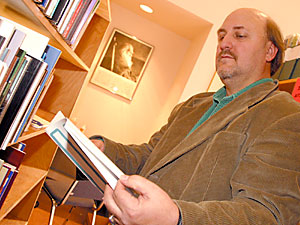 |
|
EVAN CARAVELLI/Arizona Daily Wildcat
|
Charles Alexander, a local Tucson poet, browses the UA Poetry Center's library on the corner of East First Street and North Cherry Avenue. He will be teaching a seven-week poetry workshop starting Feb. 23.
|
|
|
By Mark Sussman
Arizona Daily Wildcat
Thursday, February 19, 2004
Print this
"Ask for rubbers in your prayers. They are doubles but are they brothers." For most, these lines by Jackson MacLow do not evoke the word "poetry." For some, though, they contain the very essence of language.
It's about the sounds. It's about how the words interact with each other.
The upcoming class "Circling and Center: L-A-N-G-U-A-G-E and Its Peripheries," focuses on a certain mode of poetry sometimes called "language poetry." So what the hell does that mean? Charles Alexander, local poet, founder and executive director of Chax Press, and the instructor of the class, tries to explain.
"Language poetry," said Alexander, "is primarily poetry that changes the terms [of poetry] from being about self-expression to language as the primary medium. The attention is on what language does rather than what it has to say."
If that sounds a bit vague, it is because language poetry means something different to everybody.
"I hesitate to call language poetry a movement," said Alexander.
Perhaps the term "movement" would imply unity, something that many language poets call into question by asking exactly what words mean, what it means to use words, or if the "use" of words is possible. "Shall I compare thee to a summer's day?" it's not.
However, language poetry isn't just about the words themselves. It emerged in America in the early 1970s, a time of serious political upheaval. This type of poetry was itself embroiled in the same questioning of values and growing cynicism toward figureheads of authority, yet remained at the peripheries of American literature. Since that time, though, language poetry has gotten more popular, at least among contemporary poetry aficionados.
"I'm sort of concerned," said Alexander, "that the techniques of language poetry are entering mainstream poetics. I think there was a general distrust of direct speech coming from the media and government, and that language had to be broken open. I'm a little concerned that the political motivations are being lost. It's important to see where the work came from and its motivations."
These political motivations, too, are couched in language. The poets had a sense that that they were being lied to, and that the medium through which these lies traveled was speech, whether an address from the president or an anchorman. Writing, the poets felt, was more "honest" because it was open to interpretation and manipulation.
The class, which is being taught through the UA Poetry Center, will begin by examining the context of language poetry as it emerged in the '70s and how it subsequently broke through into the consciousness of the global poetry community. It will also examine some precursors to language poetry, such as Gertrude Stein, who explored the possibilities of language in radically new ways earlier in the century.
The class will then proceed through most of the major practitioners of language poetry, such as Rae Armantrout, Leslie Scalapino, Ron Silliman, and Charles Bernstein, among others. The last week will explore the influence of this poetry on other contemporary writers.
"Most people taking the class seem to be poets," said Alexander, "so there will be an emphasis on how the poetry was made. But it's not a workshop."
"Circling and Center: L-A-N-G-U-A-G-E and Its Peripheries" runs from Feb. 23 to April 5, 6 to 8pm at the Poetry Center, 1600 E. First St. The class costs $165 plus an additional $15 materials fee. The required text is "In the American Tree" edited by Ron Silliman. Anyone interested in the class should contact the Poetry Center at 626-3765.
